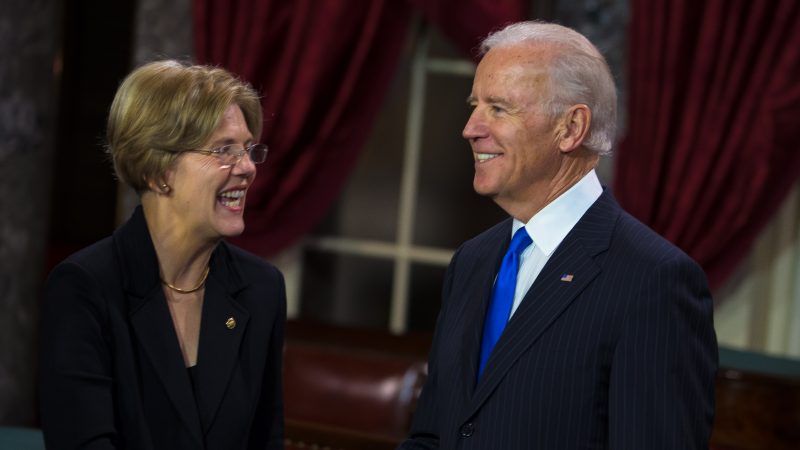Joe Biden and Elizabeth Warren Unveil Dueling Trillion-Dollar Climate Policies
The two Democrats' climate action plans reveal a near limitless faith in the ability of government to reorganize the economy.

It's a big day for climate policy in the Democratic primary, as both Sen. Elizabeth Warren (D–Mass.) and former Vice President Joe Biden have released major new initiatives to combat climate change and transition the U.S. to a bright, new clean-energy future.
"Science tells us that how we act, or fail to act, in the next 12 years will determine the very livability of our planet," Biden tweeted today. "As president, I will use every authority available to me to drive progress."
Warren was no less sweeping in her rhetoric, saying that "with bold investments, we can fight climate change, achieve the ambitious targets of the Green New Deal, and create more than a million good jobs here at home."
Both plans call for spending trillions of dollars on green technologies in order to decarbonize industry and transition the U.S. to a net-zero emissions economy. Yet there's quite a bit of daylight between the two candidates' proposals.
Biden's Clean Energy Revolution is a more haphazard plan that does its best to squeeze a multitude of progressive hobby horses into a single proposal. It calls for spending $1.7 trillion over 10 years (which he says will kickstart a further $3.3 trillion in state, local, and private investment) to transition the country to net-zero emissions by 2050.
To do this, Biden would invest $400 billion in researching and developing clean energy technologies, build out a high-speed rail network, install 500,000 electric car chargers across the country, and rehab infrastructure and buildings to be more emissions-friendly and climate resilient.
On the regulatory side, Biden would impose new methane pollution limits, strict energy efficiency standards for appliances and buildings, and fuel economy standards "aimed at ensuring 100 [percent] of new sales for light- and medium-duty vehicles will be electrified."
His plan also calls for rejoining the Paris Climate Agreement—which President Donald Trump pulled the U.S. out of—and stepping up federal prosecutions of polluting corporations. Biden's plan also calls for limiting suburban sprawl and exploring greater use of nuclear power.
Warren's Green Manufacturing Plan, by contrast, is much more focused. In it, she calls for spending $2 trillion over 10 years on three major new policies. The first is a "Green Apollo Program," which would, as with Biden's plan, see the U.S. government spend $400 billion on "clean energy research and development."
Warren also calls for a Green Industrial Mobilization drive, which would see the federal government spend some $1.5 trillion on new clean energy products to be used by federal, state, and local governments, or resold abroad. Government purchases of these clean energy products would be limited to those made in America by companies that pay a minimum $15 per hour wage, guarantee 12 weeks of paid parental and medical leave, and allow their employees to exercise collective bargaining rights. Lest you think this will drive up the costs of procuring new green technologies, Warren's plan calls for "tight cost controls" on everything the government buys.
To round out her climate policy, Warren calls for a Green Marshall Plan which would spend $100 billion subsidizing the export of all these new U.S.-manufactured green technologies to foreign polluters as a way of helping them clean up their act. A new federal office would be established to help negotiate these deals with foreign governments.
In addition to being more focused than Biden's plan, Warren's is also more nationalistic and mercantilist, given her plan's explicit goal of boosting both domestic manufacturing and foreign exports. The senator has presented it as one part of her new "Plan for Economic Patriotism."
Both plans reveal a near limitless belief in the ability of government—with enough spending and enough regulation—to totally transform the U.S. economy. That should make all Americans incredibly wary.
